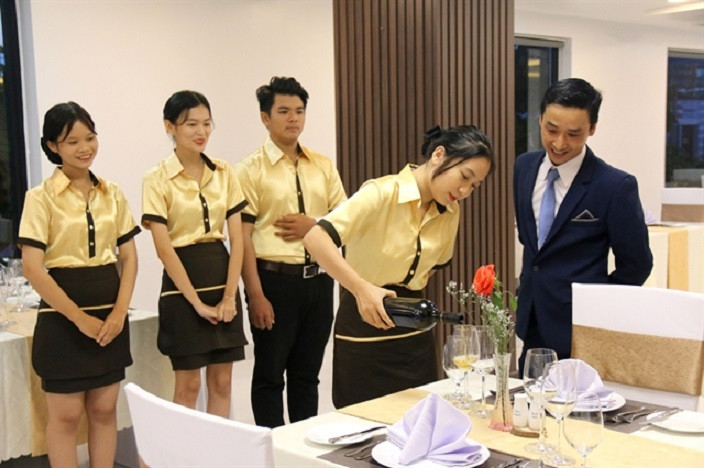
Việt Nam needs urgent solutions to develop its tourism workforce, both in quantity and quality, to turn this human resource into a national advantage and enhance competitiveness with other countries in the region and globally.
Experts have emphasised the importance of retraining and enhancing skills for the tourism workforce, especially in information technology, smart tourism and related knowledge.
Việt Nam has set the goal by 2030 for tourism to become a spearhead of the economy and for the country to become a leading global destination, with top-notch tourism development capacity that meets the requirements and goals of sustainable development.
To achieve this, the demand for labour to support the development of the tourism industry is immense, but there is still a severe shortage of human resources in the tourism sector.
Vũ Thế Bình, Chairman of the Vietnam Tourism Association, said that currently the industry only attracts about 60 per cent of the workforce and many highly skilled individuals have shifted to other sectors without returning.
This situation has led many tourism businesses, especially accommodation facilities, to rely on untrained labourer to serve tourists, he said.
Nguyễn Quốc Kỳ, Chairman of the Board of Directors of Vietravel, said the number of staff in accommodation establishments is only around 300,000. During peak periods such as holidays and Tết (the Lunar New Year), many tourism accommodation facilities face a significant shortage of staff.
Furthermore, the structure of the tourism workforce is uneven and severely lacks highly skilled workers, especially in senior management positions. This imbalance leads to situations where some areas experience hot growth in tourist numbers but provide low-quality and unstable services, he said.
According to the Vietnam National Administration of Tourism (VNAT), the entire industry needs about 40,000 new employees each year and 25,000 employees who need to be retrained with new skills.
Experts also emphasised that the demand for tourism among the public is increasingly diverse and extensive, thus the workforce in this industry needs to innovate to meet the needs of visitors.
Nguyễn Thanh Bình of the VNAT’s Tourism Accommodation Management Department stated that the trend of personalised tourism experiences, such as small group tours, requires personalised services. This necessitates personnel in accommodation establishments to be sophisticated, catering to individual preferences, serving the interests of each guest, and maintaining records of past customers.
He also highlighted the trend of ‘once-in-a-lifetime’ tourism experiences, which demands high-quality, specialised products from accommodation establishments, providing guests with ‘dream vacations’, especially for those with high spending capabilities.
From the perspective of directly designing, managing and operating many tours to the Mekong Delta, Võ Văn Phong, Director of C2T Tourism and Communication Company, emphasised the importance of equipping tourism personnel with new skills.
For example, taking tourists to rural areas to experience agricultural tourism in traditional villages and immerse themselves in the local life requires tour guides with storytelling skills about rural culture, photography, and videography expertise.
The farmers involved in tourism activities also need training to understand the psychology of tourists and vividly introduce the beauty of rural life, he added.
Providing specific examples for Muslim tourists, Trần Văn Tân Cương, Director of Vietnam National Halal Company Limited, said this is a significant market for Vietnamese tourism. To tap into this new market, there needs to be a workforce understanding the specific dietary requirements and religious rituals of Muslim tourists.
Accommodation facilities must ensure staff possess knowledge and communication skills tailored to the needs and religious practices of Muslim guests, respecting their religious beliefs and dietary habits to seize the opportunity and attract this potential market segment, he stressed.
Nguyễn Quốc Kỳ, Chairman of the Board of Directors of Vietravel, suggested that authorities conduct surveys, assessments and forecasts for the tourism workforce demand both in the short and long term.
They should also develop and implement plans and strategies to develop the tourism workforce in line with overall planning, development requirements, goals and tourism development orientations.
In addition, he said, localities need to enhance efforts to attract skilled experts and labourers from outside into priority sectors or fields where the local workforce is still insufficient and weak.
Agencies should provide solutions, guide households, as well as small and medium-sized enterprises in tourism, to engage in skill training aimed at revitalising and developing traditional crafts, establishing tourist attractions and producing souvenir items to serve tourism development.
Bùi Thị Ngọc Hiếu, Deputy Director of HCM City Tourism Department, stated that the department places special emphasis on improving the professional and language skills of tourism personnel, especially frontline employees such as tour guides, restaurant servers, housekeeping staff and receptionists.
Hiếu said the department has collaborated with the HCM City Tourism Association to organise competitions for excellent tour guides and housekeeping professionals, providing opportunities for updating and supplementing new information about ecotourism, community-based tourism and responsible tourism practices.
She suggested local authorities attract talented professionals and skilled labourers from outside into priority sectors or areas where the local workforce is insufficient. Functional agencies should provide support and guidance to households and small and medium-sized enterprises in tourism, offering skill training to revive and develop traditional crafts, establish tourist attractions, and produce souvenir items to serve tourism development. – VNS